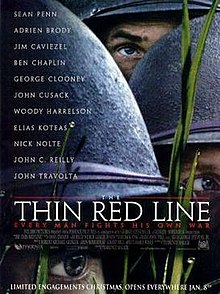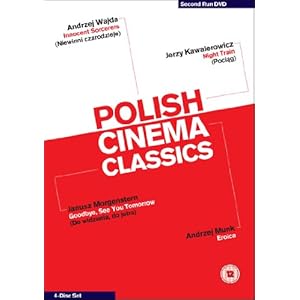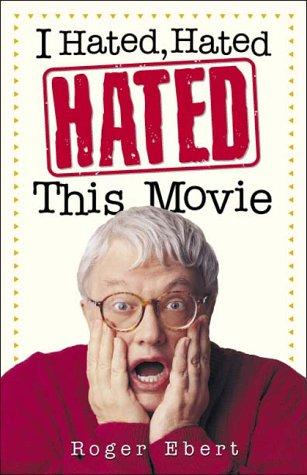Friday, December 14, 2012
Thursday, November 8, 2012
The Terence Davies Trilogy (1976-83, Davies)
My latest piece for Roger Ebert's Far-Flung Correspondents site is a take on The Terence Davies Trilogy. Read it here.
Monday, October 15, 2012
Ashes and Diamonds (1958, Wajda)
My latest piece for Roger Ebert's website is on Andrzej Wajda's Ashes and Diamonds. You can read it here.
Monday, September 3, 2012
Dirty Dancing (1987, Ardolino)
My new piece for "The House Next Door" 'Summer of '87' series is on Dirty Dancing. Click here.
Thursday, August 30, 2012
To Rome with Love (2012, Allen)
My latest piece for Roger Ebert's Far-Flung Correspondents is on Woody Allen's To Rome with Love. Read it here.
Thursday, August 16, 2012
Sunday, August 12, 2012
A Letter to Three Wives (1949, Mankiewicz)
My latest piece for Roger Ebert's Far-Flung Correspondents is devoted to Joe Mankiewicz's A Letter to Three Wives. Read it here.
Saturday, July 28, 2012
Dynasty Craze!
My new piece for Roger Ebert's website goes back to the early 1990s and the Polish Dynasty craze. (Click here)
Sunday, July 22, 2012
Monday, June 25, 2012
The Unspeakable Act (2012, Sallitt)
My review of Dan Sallitt's excellent new movie, The Unspeakable Act, in available on Roger Ebert's website (click here).
Saturday, June 9, 2012
My "Sight & Sound" Poll Entry
I feel honored to take part in the upcoming Sight & Sound Greatest Film Poll. Here is my ballot:
1. Rear Window
(1954, Alfred Hitchcock)
Superbly
crafted allegory of watching and following that touches upon our primal
voyeuristic drives. By the end of the screening, the film seems to be looking
back at us with an amused little smirk. Hitchcock defines the movies; Rear Window defines Hitchcock.
2. The Long Day
Closes (1992, Terence Davies)
Cinema
is both a retreat and a prison in Davies’ memoir of childhood bliss slowly
turning into scary gay desire that the protagonist doesn’t know how to handle.
A love song that is also a dirge, it’s a profoundly sad work of immense beauty.
3. The Thin Red
Line (1998, Terrence Malick)
Malick’s
Whitman-by-way-of-Emerson poem of grace intertwined with death is as boundless
as it is instantly accessible (not to mention totally immersive). Edited in
accordance with the world’s hidden heartbeat that Malick seems completely
attuned to, it never fails to intoxicate me, no matter how often I see it.
4. City Lights
(1931, Charlie Chaplin)
No one
merged emotional mush with slapstick brilliance in quite this way – you can be
angry at the movie for tugging at your heart strings, but you stand no chance
of resisting its pull.
5. WR: Mysteries
of the Organism (1971, Dušan Makavejev)
The
only movie that managed to accommodate and satirize all the Cold War chasms at
once, and do so in a happy-collage way that’s as ingenious as it is brilliant.
6. Partie de
campagne (1936, Jean Renoir)
“Unfinished”
only in the most crude of senses, this is a work that overflows with emotion to
the point of drugging the viewer into an uncontrolled reverie. A masterpiece of
sensual seduction that feels both like a breeze and a barely suppressed sob of
sympathy for all human dreams and desires.
7. L’Atalante (1934,
Jean Vigo)
Cinema
as a diaphanous waft of half-dreamed desire; the most beautiful erotic dream
ever put on film.
8. Man with a
Movie Camera (1929, Dziga Vertov)
In
some YouTube visual dictionary of tomorrow, a full video of this movie may as
well serve as the most comprehensive definition we have yet of „modernity”
itself.
9. Only Angels
Have Wings (1939, Howard Hawks)
Unyielding
in its reproach of sentimentality, this is a work of true feeling and deep
compassion that asks for nothing and gives you everything.
10. Topsy-Turvy
(1999, Mike Leigh)
The
most Dickensian movie ever made is as rich as a finest novel and accommodates
everything from gaiety to sadness to grief to song.
Monday, May 28, 2012
My Cannes 2012 Coverage
My 10-part "Hammer to Nail" coverage of the Cannes Film Festival is available here (navigate the list of my favorites to get to specific reviews).
Saturday, May 26, 2012
Cannes: Mud (2012, Nichols)
Stand
by Mud
Less a spectacular train wreck than a sad disappointment, Jeff
Nichols’ Mud is a movie of great earnestness and little imagination: a
surprisingly trite and simplistic coming-of-age story in which predictability
trumps everything else, including much-needed sentiment. Just like the
director’s previous effort (the sublimely filmed, if ultimately shallow, angst-fest
Take
Shelter), Mud is also concerned with a possible break-up of a marriage as
filtered by the mind of a susceptible member of a family. Whereas Michael
Shannon’s Curtis projected his fear of marital separation into a series of
apocalyptic visions, the new movie’s protagonist – a feisty fourteen-year-old Alabama
boy named Ellis (Tye Sheridan) – escapes into a much more welcoming fantasy.
The boy, rightly sensing some tension between his parents, latches onto a
newly-found adult pal in the person of Mud (Matthew McConaughey), hiding in a
boat surreally left atop of a tree after a recent flood. Mud escapes justice
after having killed his infidelity-prone girlfriend’s latest lover, and she’s
waiting for him in a dingy motel so that they can elope together. For Ellis,
Mud’s situation has a tremendous appeal – a pint-sized romantic that he is, he
imagines Mud’s devotion to be the true love so acutely absent between his folks.
He does all he can to help out his new idol in making the boat usable again (by
hook as well as by crook), and finds an additional incentive when he meets
Mud’s girlfriend, Juniper (Reese Witherspoon), who seems to him an embodiment
of fragile innocence under pressure (crush ensues).
Mud is all about letting go of
illusions and assuming responsibility. Unfortunately, Ellis’ gradual
disenchantment is portrayed in a painstakingly obvious manner. Nichols takes
his time and hedges his bets, too: virtually nothing is left unsaid, and the
crucial plot points are so heavily underlined that they all but become parodies
of themselves. Some of the crucial scenes of disillusionment are stretched out
beyond measure until they lost their impact, others embarrass with completely
superfluous dialogue.
The film – while way too long at its current 130 minutes – certainly
doesn’t lack for acting talent and overall technical competence. Too cerebral to
feel heartfelt, too earnest to seem inspired, Mud comes dangerously
close to being a watered-down faux-John Sayles movie, in which intentions
replace actual experience. Nichols is too smart to aim for genuine, heart-tugging
mush of the Stand By Me variety, and yet not detached enough to bathe his
movie in a sense of true strangeness. It’s a shame to see that gifted filmmaker
succumb to generic weaknesses (that were only latent in Take Shelter) and deliver a movie that doesn’t lack
for ambition but ends up merely passable.
Sunday, May 13, 2012
EbertFest Panels on Video
All the panels that happened at EbertFest are now available on video, including the Far-Flung Corespondents one that I had the honor of participating in. You can watch them all here.
Monday, May 7, 2012
Babak Geranfar on the Movies
My good friend from Iran, Babak Geranfar, has just made his debut as a writer of notes on MUBI. Don't miss them, he's a great guy and a faithful follower of Stanley Cavell, alias THE MAN. His notes are to be found here.
Monday, April 23, 2012
Ebertfest
I'm honored to be part of this year's Ebertfest and looking forward to meeting all the other Far-Flung Correspondents! Watch us live as we riff on our national cinemas on 4/26. Full list of Ebertfest live-streams is to be found here.
Monday, April 2, 2012
Sicinski on Davies
Kudos to Aaron Cutler for pointing me to this here fine essay written by Michael Sicinski.
Sicinski's point is well-taken and largely valid. Davies' cinema is indeed about mouring a loss, and not about projecting social change (unless by enraging the viewer at the stilted gay man's life it presents). Having said that, Sicisnski conveniently leaves out THE NEON BIBLE, which has the Gena Rowlands character (representing a successful filght from a small-town backwater existence and actually enjoying her freedom) and framed by the image of the boy escaping his rural life by that epitome of robust modernity - a train. Also: comparisons between Hester from TDBS and Lily from THOM can only extend so far. Lily's not a slave to her passion, but to her sense of what's morally right. She's as fierce a believer in personal accountability as Hester is, but carnality barely figures among her major drives.
Thursday, March 29, 2012
Honey, I Shrunk the Kids (1989, Johnston)
My latest piece for Roger Ebert's site is on one of the cult movies of my childhood: Honey, I Shrunk the Kids (1989). Read the article here.
Monday, March 12, 2012
Polish Cinema Classics (Second Run DVD)
From today on, the new Second Run DVD box set, "Polish Cinema Classics", is available from Amazon.co.uk. You can find out more about this excellent edition (as well as read fragments of Michael Brooke's top-notch booklet essay on Janusz Morgenstern's Goodbye, See You Tomorrow [1960]) here.
I had the honor and the pleasure to contribute a booklet essay on Andrzej Wajda's Innocent Sorcerers (1960) for this edition, which spotrs a gorgeous new transfers of all films as well as many other extras. Below, I attach a portion of my essay, the full version of which is to be found in the DVD booklet.
* * *
(...)
[Innocent Sorcerers] is centered on the character of Andrzej: a young, hip, heavily womanizing doctor, who divides his time between his medical practice at a boxing arena, constant dating, and playing jazz in a local den where he’s known as a drummer with the stage name of “Medic”. With his bleached hair and never-less-than-cool demeanor, Andrzej is both a proto-hipster and an almost otherworldly creature of the night: always on the prowl, never taken aback by anything, forever playing the seduction game he’s so apt at he doesn’t bother much with using first names of his lovers. He comes close to being an erotic omnivore, save from the fact that he’s strictly heterosexual. It’s worth remembering, though, that – as Adam Garbicz pointed out – Łomnicki was tempted to play Andrzej as bisexual, which might have been rooted in Andrzejewski’s script (not that it would come as a surprise, considering Andrzejwski was gay himself and often communicated his largely repressed desires in his work; most strongly in his single-gargantuan-sentence novel Gates of Paradise, also filmed by Wajda in 1968).
(...)
The fact that Wajda used many actual Warsaw locations, such as the “Gwardia” stadium and “Largactil” jazz club, as well as populated his movie with a slew of real-life jazz personalities (such as Jan Zylber, Andrzej Trzaskowski and the film’s composer Krzysztof Komeda, playing a character named after himself), gave the film a distinctive, timely feel. Juicy bit-parts delivered by young Roman Polański and the forever-purring Kalina Jędrusik (as a sexy reporter making bedroom eyes to Andrzej even as she interviews him), further embellished Innocent Sorcerers and made it into a lively snapshot of the period. Even the self-consciously modern touches, such as including the film’s actual poster in its own opening shot, and making the featured radio announcer comment on “the new song from the film Innocent Sorcerers, sung by Sława Przybylska”, have a unmistakable flavor of a homespun nouvelle vague. It’s also worth noting that the shooting of Sorcerers… was simultaneous with that of Jean-Luc Godard’s Breathless (1959): yet another double portrait of “immoral” youth that was about to set cinema itself ablaze.
The heart of the movie lies in Wajda’s handling of the two central characters and their milieu. Andrzej’s makeshift apartment – simultaneously turgid and hip – is masterfully established in one of the film’s earliest and longest takes, in which we get to witness the main character’s entire morning routine, lovingly conveyed by Tadeusz Łomnicki in about twenty consecutive bits of business (some spectacularly simultaneous, all equally captivating). What we see amounts to a near-ritual of habitual shaving (with what counts as the apartment’s most modern appliance: an electric razor-blade), jazz-listening, paper-reading and tape-playing of romantic conversations doctor had with a ditched date named Mirka. Throughout the scene, Andrzej manages to move around gracefully enough so as to never get entangled in the multitude of electric cords hanging down (“liana-like”, per Stefan Morawski) in all directions and from every wall.
(...)
A couple of stunning films by directors like Polański and Skolimowski aside, it won’t be until the 1970s and the arrival of the Cinema of Moral Anxiety movement that Polish cinema will become animated once again by a shared spirit of artistic and political urgency [which marked Polish Film School movement]. Perhaps not surprisingly, it will be Andrzej Wajda’s Man of Marble (1976) that will be seen as that movement’s masterpiece – centered on a young reporter Agnieszka (Krystyna Janda), whose fierce commitment to the truth and whose fearless struggle will seem the complete opposite of the seemingly complacent lives of “Bazyli” and “Pelagia”. In fact, her resistance will be rooted in their ennui. They refused to take their reality seriously; she sets out to rebuild it and make it livable again.
Thursday, March 8, 2012
Andrzej Żuławski @ BAM & Cinefamily
On the occasion on the first-ever US retrospective of the great Polish director Andrzej Żuławski, I did a complete coverage of his films for Slant Magazine's The House Next Door. The full program of the BAM retro can be found here, L.A. Cinefamily's parallel event's here, and below I attach link to all of my Slant pieces:
The Third Part of the Night
That Most Important Thing: Love
On the Silver Globe
Pavoncello / The Song of Triumphant Love / The Devil / The Public Woman / Mad Love / The Shaman
My Nights Are More Beautiful Than Your Days / Possession / Boris Godounov / Blue Note / Fidelity
Also, don't miss J. Hoberman's NYT coverage, as well as his note for Blouin Artinfo, in which my The Third Part of the Night note is generously quoted.
Sunday, February 19, 2012
My Berlinale 2012 coverage
Tuesday, February 7, 2012
"I Stand Alone" audio commentary
Me & Simon Abrams ("Extended Cut") comment on Gaspar Noé's I Stand Alone. These five videos were made in 2009. Long since deleted from YouTube, they now make a comeback on Vimeo:
Saturday, February 4, 2012
My IFFR 2012 Coverage
The Rotterdam festival proved to be a great experience. Here is my collected coverage of it I did for The House Next Door:
And here's an IndieWire/The House Next Door video we did with Kevin B. Lee and Aaron Cutler.
Saturday, January 28, 2012
My Sundance Film Festival '12 Coverage
Here’s my collected Sundance Film Festival coverage for Slant Magazine:
Dispatch #1 (Simon Killer)
Dispatch #2 (For Ellen – The House I Live In)
Dispatch #3 (Bestiaire)
Dispatch #4 (Keep the Lights On)
Dispatch #5 (2 Days in New York – For a Good Time, Call…)
Dispatch #6 (Room 237)
An extra piece co-written for Fandor is here.
Dispatch #1 (Simon Killer)
Dispatch #2 (For Ellen – The House I Live In)
Dispatch #3 (Bestiaire)
Dispatch #4 (Keep the Lights On)
Dispatch #5 (2 Days in New York – For a Good Time, Call…)
Dispatch #6 (Room 237)
An extra piece co-written for Fandor is here.
Tuesday, January 17, 2012
On J. Hoberman
My piece on my experience of reading and translating J. Hoberman’s work is now available on Fandor (click here).
Sunday, January 8, 2012
Roger Ebert's Far-Flung Correspondents
I'm happy to announce that today I became one of Roger Ebert's Far-Flung Correspondents, thanks to a kind introduction by my former Fandor editor, Kevin B. Lee (the author, among other things, of the recent YouTube smash-hit video-essay "The Spielberg Face").
My first piece for Ebert's site is available here, and it's on Jerzy Skolimowski's terrific Deep End (1970).
Thursday, January 5, 2012
"A Separation" wins "Kino" 2011 Poll
I’m happy to report that the wonderful A Separation (2011) has been chosen as the best movie shown on Polish screens in 2011 by “Kino”, the oldest Polish film monthly. I had the pleasure of submitting a ballot, as well, and I keep my fingers crossed for the further successes of Asghar Farhadi’s terrific movie.
Wednesday, January 4, 2012
3 Q&A's with American Filmmakers
Thanks to my friend, the photographer and artist Joanna Konik, some of the Q&A’s I did for the American Film Festival in Wrocław are now available on-line. Here is a bunch of them:
I talk to Michael Di Jiacomo, director of Somewhere Tonight here.
I talk to Jaffe Zinn, the director of Magic Valley here.
I talk to Clay Jeter, the director of Jess + Moss, and to his star Sarah Hagan, here.
Subscribe to:
Posts (Atom)





























